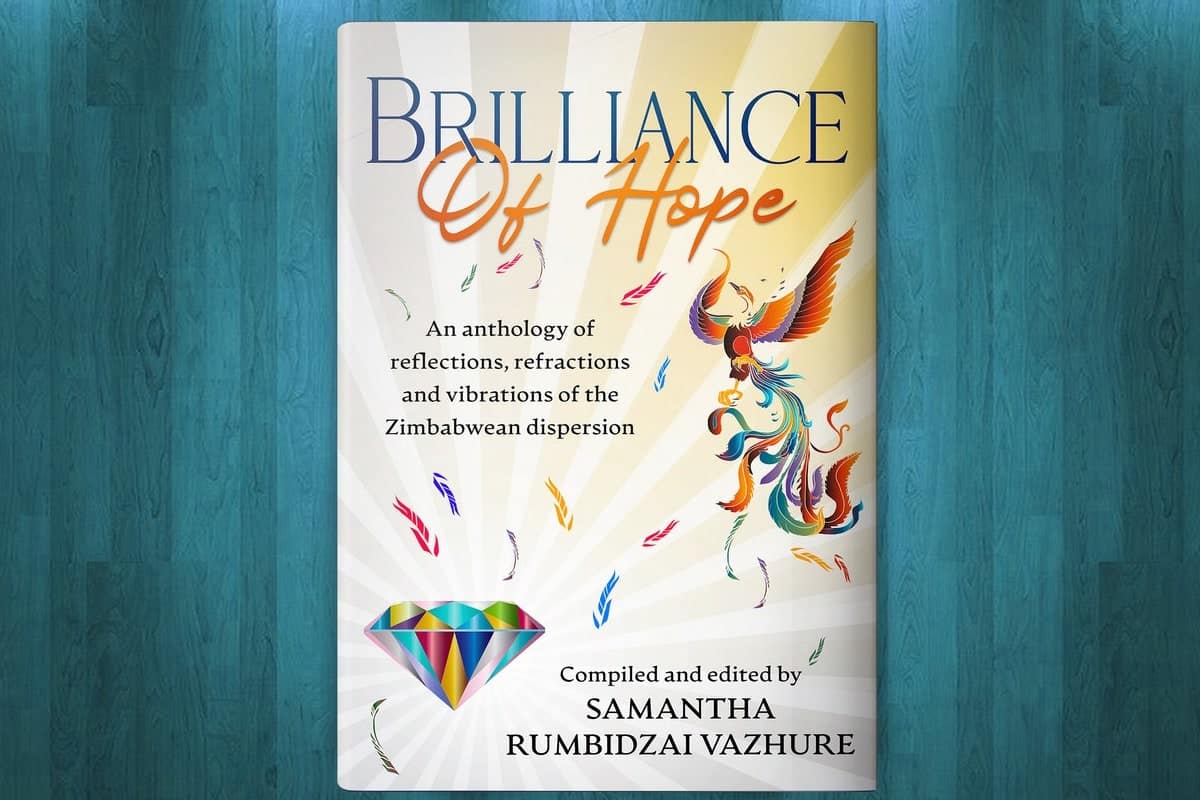“We are like the man in the Igbo proverb who does not know where the rain began to beat him and so cannot say where he dried his body.”
– Chinua Achebe
The collection creates a rich mosaic of short stories in brilliant prose and poetic form. Brilliance of Hope carves a significant niche for itself, more so, for pioneering a trailblazing collaborative approach through bringing together underrepresented voices whose stories are certainly lofty in charting the migrant experience. What should be lauded is how Samantha Vazhure (the anthology’s editor) has accorded an enabling platform to nascent voices whose sublime excellence shines throughout the myriad stories and is therefore a harbinger of greater things to come.
I found myself enthralled, teleported, and catapulted to dizzy heights by these talented voices, as I traversed with them from the ‘iron pyrite’ streets of Johannesburg South Africa, the rough and tumble of Cyprus to the nimble streets of London. Throughout my literary travails, a common theme punctuated the innumerable narratives, i.e., what does it mean to be far away from home, what are the trials and adversities of navigating the diaspora terrain particularly for first generation immigrants? This literary project marks an uncharted territory of creative output which worked out well through deploying numerous voices amplifying the diaspora experience and what happens in the aftermaths of dispersion.
Tales like Brilliance of Hope are relevant in enabling us to appreciate in Achebe’s words, ‘‘where the rains began to beat us in order to know how to effectively dry ourselves.’’ How can we as migrants scattered all over the world ever be able to make sense of our new lived culture in these foreign habitats? Will there ever be a homecoming of some sort as some of the stories or voices in this anthology yearn? Perhaps, the answer to this is aptly provided in the anthology editor’s short story, Tariro, a befitting denouement in which Samantha Vazhure seems to acknowledge through her story ‘‘that we are now living in a global village. Should we perhaps begin to feel at home wherever we are.’’ These are a plethora of some of the pertinent questions this anthology raises.
Some of the conspicuous stories to stand out for me were Tariro Ndoro’s La Duma 32/12 and Rudo Manyere’s Zadzisai, a prelude to her forthcoming novel. Tariro Ndoro’s Abishai was quite notable a story as was her dystopian gem Stasis. Ndoro expertly weaves her sublime craft in the latter through a dystopian lens which resonates with our postmodern world and the seemingly surreal events in this story were akin to acclaimed popular TV show, Charlie Brooker’s Black Mirror. I was absolutely dazzled by the genius creativity imbued in this story as the protagonist Chiedza amplified the position of vulnerable black women in a futuristic South Africa.
The hallmark of the generality of the short stories which underlines their prowess lies in the multiplex fusion of cleverly infused/merged experimental narrative structure such as the beautiful prose and poetic style in An Ode to My Aching Heart by Ivainashe Ernest Nyamutsamba, the allegorical La Duma 32/12 and Tariro Ndoro’s expert narrator in Abishai. There is also the extensive use of soliloquies and turbulent stream of consciousness in Yours Truly I’m Gone by Nyamutsamba. The stories are a feast of manifold, captivating storylines presented through these unique narrative techniques tropes. And we do need these novel narrative techniques as a living testament to Zimbabwean literature’s enduring, soaring brand.
Stories such as Mabvuku to Marylebone and These Were the Voices among others captures the quintessential Zimbabwean resolve – resilience and grit. Broken families, frayed family bonds particularly the emotional distance obtaining amongst kith and kin underlines the relationships painstakingly painted in these narratives as a woman, Mainini constantly pilfers money both from her broken, emasculated husband and the nephew she helped relocate from Zimbabwe, Ticha. The manipulative aunt feels that the nephew therefore has to be in perpetual bondage of paying back her supposed munificence until he wizens up and breaks free from her predatory grasping clutches. The curse of black tax a recurring motif in Zimbabwean literature rears its head through this story where its shown to be analogous to being indentured like in yester-year serfdom and slavery, whereby one remained perpetually indebted and bound to their ‘master’ only the master in this case are one’s fellow kith and kin both in the diaspora and back home who continue to exercise a unreasonable sense of entitlement by asking for more.
These stories were personal to me as a fellow immigrant who has traversed the length and breadth of the greater diaspora in search of the proverbial elusive greener pastures, the fickle British pounds sterling. Thus, it was an emotional and cathartic journey as I felt I was also on that maiden journey with Simba in Elusive Dignity on his maiden trip to Cape Town. And, I am sure, I am not alone in living this vicarious journey with the multitudinous characters in Brilliance of Hope. Many migrants, fellow Zimbabweans dispersed all over the world will certainly attest and resonate with these intimate, searing with passion narratives. For, have we not all walked this road before?
Brilliance of Hope resonates and converses well with other migrant literature texts, i.e., Sue Nyathi’s The Gold Diggers, Brian Chikwava’s Harare North, Andrew Chatora’s Diaspora Dreams, Imbolo Mbue’s Behold the Dreamers among other greats. I felt Brilliance of Hope characters spoke with characters from these other cited migrant literature greats. More like symbiotic conversations at play. Whereas these texts have raised the bar on the subtleties of immigrant experience, Brilliance of Hope complements them well in extending the global conversations on these issues. The anthology’s stories are multi-layered with apt social commentary and poignantly harp on the minutiae details of the immigrant experience told through multiple voices.
The big lie often peddled to Zimbabweans back home is captured poignantly in Lazarus Nyagwambo’s Vessel for Misery in which the story is a wider metaphor of the all that glitters is not gold facile narratives used to entice desperate Zimbabweans from their homeland to the greater diaspora and Cyprus in this particular story in which a son Luke now lives on lies in a bid to ‘protect’ his parents back home in Harare as they struggle to fend for his sibling. Luke’s deception of his parents is a powerful irony itself amplifying the lies and fantasies fed to them by Gloria, the ‘fixer’ who helps him get to Cyprus.
In summation, Brilliance of Hope offers a where the rains began to beat us moment in extrapolating the numerous migrant experiences shared by Zimbabweans dispersed all over the world. If anything, the stories are a welcome pointer to how developments have panned out for many a migrant whose destiny is in some cases not within their control but at the mercy and vagaries of other variables as the stories attest.
Kudos to the editor Samantha Vazhure, the brainchild of this unique project which put together in a collection some of the best of Zimbabwean writers who are incidentally dispersed all over the world and thus well suited to chart these lived narratives. And Vazhure’s story, Barcode! What a way to end on a bang, all throughout my forays in the story, I was rooting for Kumbirai Gaza the protagonist. Dare I say, I was gutted at his hapless, perennial misfortune. Melancholia, jarring, evocative pathos tinged with beautiful prose and writing were the cacophony of emotions Barcode provoked in me. There I was relentlessly on the side of my underdog Kumbirai. And you know what, I couldn’t help chuckling though at the portrait of the self-styled exhibitionist, mercurial Ngoni, the wife snatcher. By Jove! I have seen so many Ngonis each time I visit Zimbabwe who unashamedly outdo themselves berating our existence as immigrants in the greater diaspora and how they are making it big in Harare as if we’re in a competitive race. Dude! You lead your own life, I lead mine. Play your own drum as Charles Mungoshi termed it.
Brilliance of Hope is a stellar contribution.











